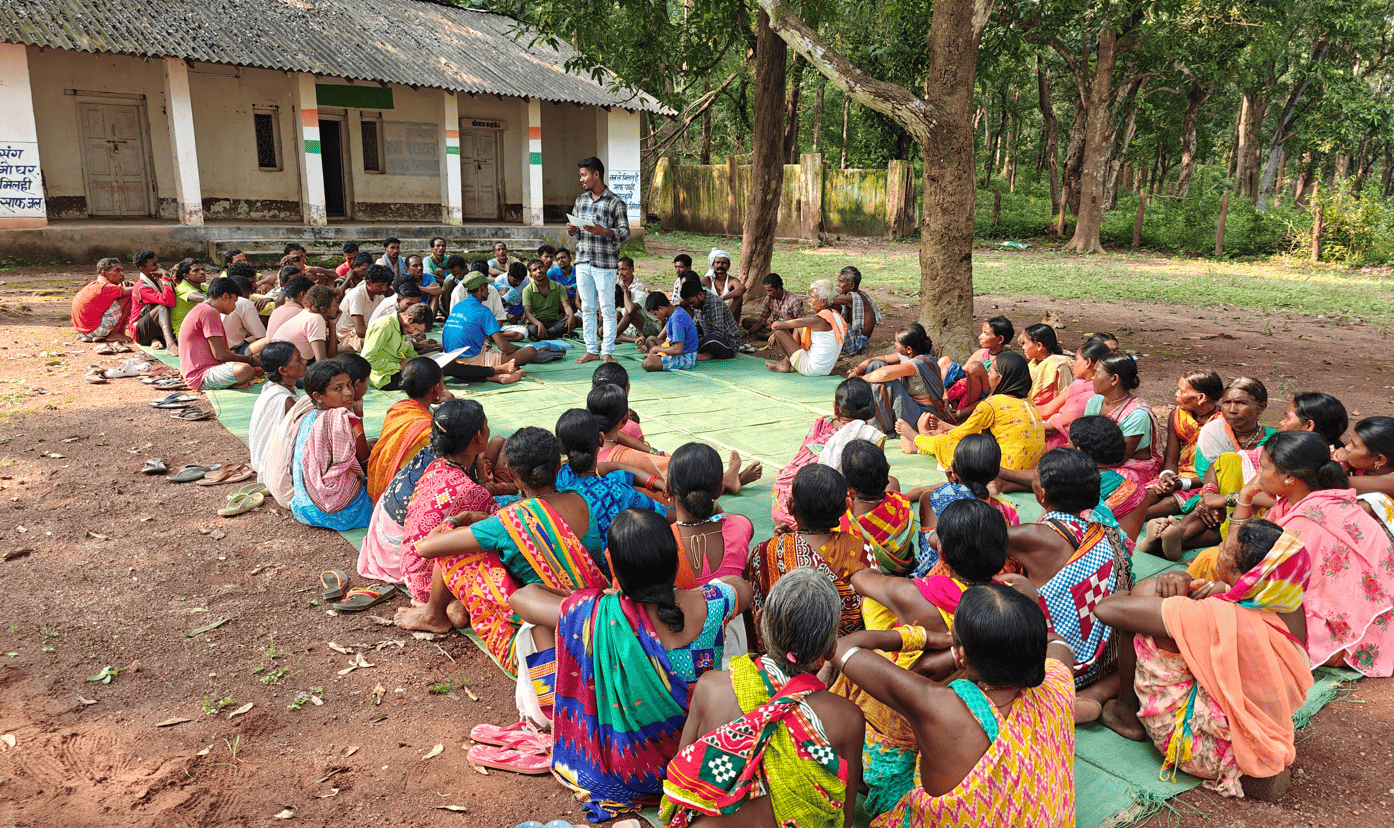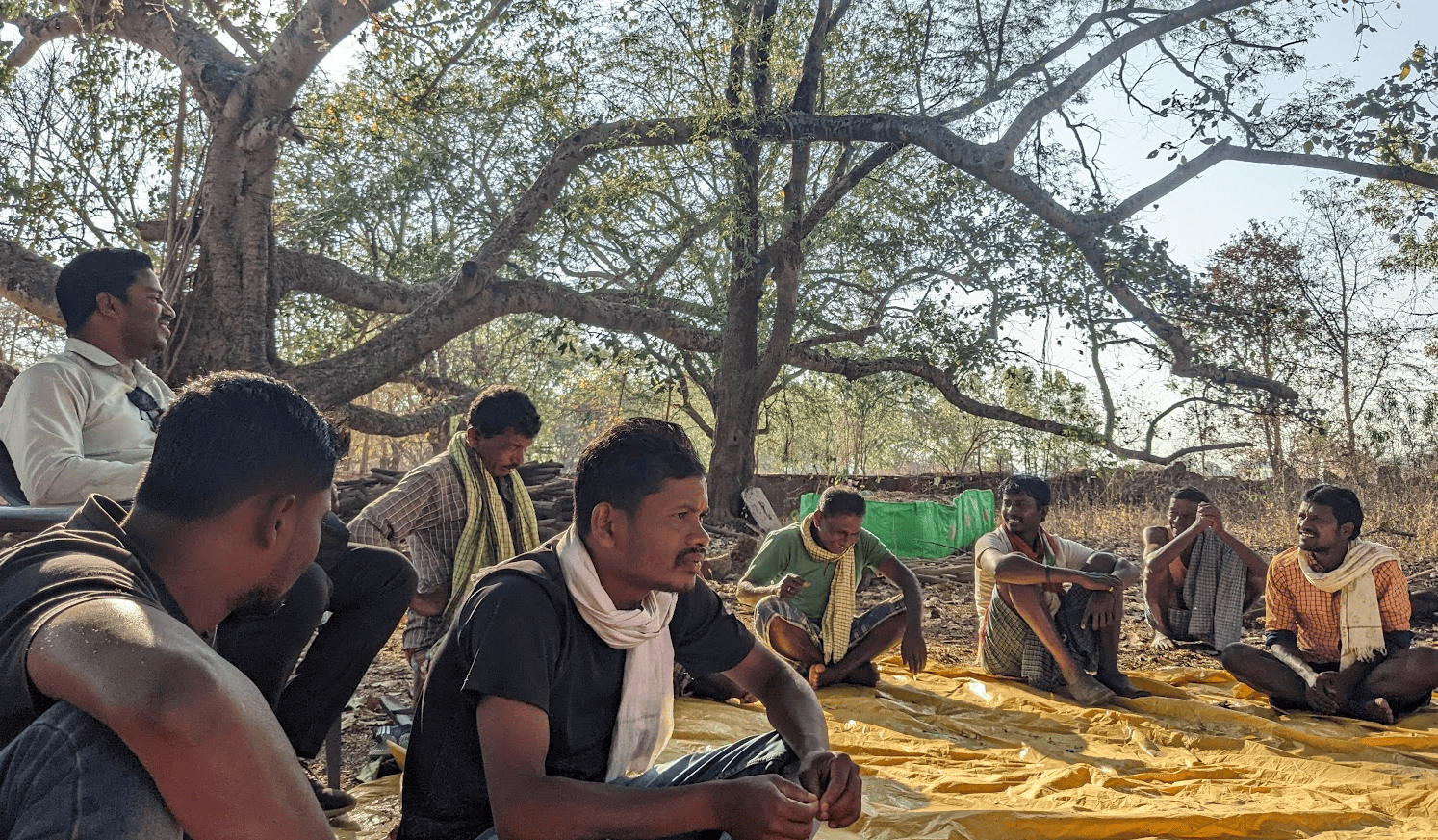By Hritik Bhatnagar
A story of how Tiriya village from remote Bastar, with support from ATREE’s CFR team, built strong local institutions to govern and protect their forests. Their efforts have earned them a place among the top 15 honorable mentions in the RRI Collective Action Awards.
Tiriya village, located in the dense moist deciduous forests of Bastar district in Chhattisgarh, is home to 72 households, primarily of the Dhurva Adivasi community. Situated near the border of Chhattisgarh and Odisha, the villagers have long depended on rain-fed paddy cultivation and the collection of non-timber forest products (NTFPs) for their livelihoods. However, with forests traditionally under the control of the forest bureaucracy, the community lacked legal rights to access and manage these resources. This not only deepened poverty for several households but also left the forests vulnerable to threats like illegal logging, overharvesting, and external encroachment.
Journey to Community Forest Rights
In 2022, the gram sabha mobilized to claim Community Forest Resource (CFR) rights under the Forest Rights Act (FRA). The process began with the formation of a Forest Rights Committee (FRC), GPS-based mapping of the customary boundaries, preparation of supporting evidence, and formal engagement with the state departments. With support from the Bastar-based team of the Ashoka Trust for Research in Ecology and the Environment (ATREE), the community undertook each step with strong participation and leadership from within the village.
Their efforts bore fruit in 2023 when Tiriya received formal recognition of CFR rights over 3,057 hectares of forest. With this recognition, forest management shifted from the Forest Department to the village. A Community Forest Resource Management Committee (CFRMC) was established to develop and implement a forest management plan.
One of the first major initiatives by the CFRMC was the launch of a regular forest patrolling system. To prevent uncontrolled harvest of forest produce by outsiders, the community organized daily patrols with 22 members on rotation, involving every household in the village. This system of voluntary contribution, known locally as shramdaan, has been sustained for over a year.
Community-led eco-tourism
The village also took steps to regulate unmonitored tourism, which was causing problems such as unregulated vehicle entry into forest areas, increasing solid waste, and concerns over safety. Inspired by a visit to Dhudmaras village, where eco-tourism had been successfully developed, Tiriya’s CFRMC initiated its own community-led eco-tourism effort. They identified a scenic site near the Shabari River and set up bamboo rafting and a picnic area. Drawing on their traditional skills in bamboo raft-making and river navigation, the community quickly built the infrastructure needed to welcome visitors.
Youth from the village played a key role in shaping this initiative. After exposure visits, they helped explore self-financed, eco-friendly options such as sourcing bamboo locally, building rafts and boats, and procuring basic safety equipment. A ticketing system was introduced to regulate the number of visitors per day, with a focus on affordability and accessibility for local tourists.
Today, tourists visiting Tiriya enjoy more than just the river—they engage with local youth, experience forest walks, enjoy traditional food, and witness a photo exhibit that narrates the village’s journey. Plans are underway to expand the eco-tourism experience to include birdwatching and guided forest trails. ATREE supports Tiriya’s efforts through ecotourism workshops centered on maintaining transparency, increasing efficiency and equity in operations.
Global recognition by RRI
At the heart of this initiative is a strong governance system rooted in the gram sabha, which remains the core decision-making body. An eleven-member CFRMC oversees forest management, while a twenty-two-member core group, representing youth, elders, and women, manages the eco-tourism operations. In recognition of these achievements, Tiriya gram sabha was recently named among the top 15 Honorable Mentions for the 2025 Collective Action Awards by the Rights and Resources Initiative (RRI) out of 190+ nominated communities. The RRI is a global coalition of grassroots organisations aimed at improving coordination and support for the recognition of land rights for indigenous people across Africa, Asia and Latin America.
Tiriya’s efforts represent a powerful example of self-determined development. Beginning with the assertion of rights over their customary forests, the village has built a sustainable, inclusive, and culturally rooted model of forest governance, reaffirming the strength of local leadership in safeguarding forests for future generations.


